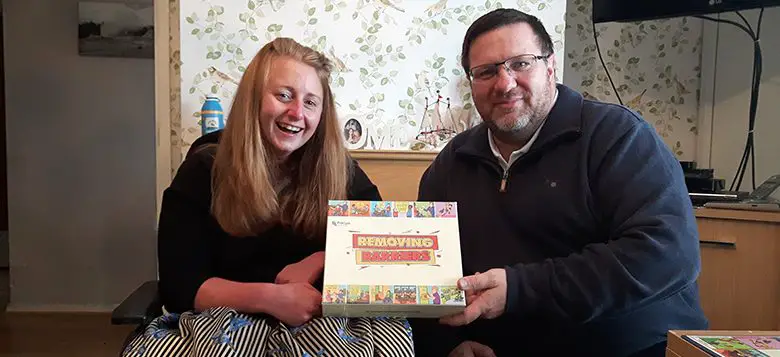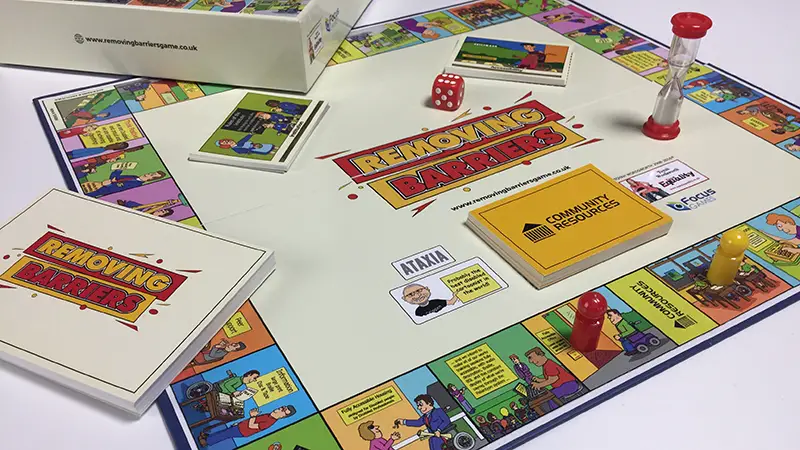
Removing Barriers: the board game that educates about disabling barriers
This is an updated post from our archives. It explores “Removing Barriers,” a board game designed to educate players about disabling barriers in everyday life, promoting greater awareness and empathy through play.
Updated 2025
Empathy Through Play: The Updated Relevance of ‘Removing Barriers’
Removing Barriers is a thought-provoking board game created to help people understand the real-life challenges faced by disabled people. By using a game format, it invites players to step into the shoes of people facing barriers in transport, employment, housing, and leisure—making it a powerful educational tool for training and discussion.
Originally launched in 2017, the game remains a valuable resource for schools, diversity trainers, and disability rights advocates. Although it may not be widely available for retail purchase today (although available here), its legacy lives on in the wider use of gamified learning to promote empathy and inclusion.
Why This Is Important Today
Using games to help people learn is becoming more popular.
These games are helpful because they can make people more caring and understanding.
What a 2023 Study Found
In 2023, a study looked at people training to be teachers.
It found that when they played role-playing games:
- 89 out of 100 became more caring.
- They got better at talking with others.
- They became more creative.
- They found it easier to deal with tricky situations.
How Games Help People with Autism
Some games, like tabletop role-playing games, also help people with autism.
These games:
- Help people talk and work with others.
- Let people practise being in different situations.
- Help people learn how others might feel.
Why ‘Removing Barriers’ Is a Good Tool
Using a game like Removing Barriers at work or school:
- Helps people understand what makes life hard for disabled people.
- Shows that the problem is not the person’s body, but the way places and people stop them from joining in.
This is called the social model of disability.
It means that it’s the world that needs to change—not the disabled person.
What This Means for the Future
Games like these can help:
- Teachers and trainers explain things better.
- People care more about others.
- Everyone work towards a fairer world.
Summary:
Games that teach about disability help people understand and care more.
They show us how to make the world easier for everyone to take part.
Accessible Alternatives in 2025
Similar tools are available that support disability awareness and inclusive education. For example, our shop offers resources designed to support communication, independence, and accessibility.
Original post follows:
We all know that being disabled means life comes with barriers. But how much do people who aren’t disabled know about the challenges we face? To ensure they’re educated, social entrepreneur Toyah Wordsworth has developed an inventive the board game, Removing Barriers. Here’s her story…
My life so far has been a multitude of experiences: some amazing times, but also much pain and trauma. But I can now say that I look forward to my future.
From the age of 8, my life began to change forever. My walking and balance began to deteriorate – I wasn’t walking straight and kept falling over and banging into things. It took two years to be sent for a brain scan, and it wasn’t until I was 13 that I was diagnosed with Friedreich’s Ataxia, a rare genetic disease that affects balance, co-ordination and speech.
After that, my symptoms became more pronounced. As a teenager, I felt despair, no hope and had a grim vision of my future. I went to the lowest place possible with no fight left in me.
But fight I did. I realised that this disease wasn’t going to beat me – I was going to live my life and turn my pain and suffering into something positive.
Living life undeterred
By 19, I was permanently using a wheelchair. This was when I started to recognise the barriers that disabled people have to face every day of their lives, just because they’re disabled. Not only that, but I also realised that it is society that creates disability – it’s just not set up to accept disabled people.
This inadvertently led me to my career. Although I’d experienced a lot of rejection while looking for a job, I began working for a charity, where I started holding disability training workshops for corporations and government organisations, educating employers and their staff.
I also started mentoring other disabled people through voluntary work. By this time, my condition had become more aggressive, so I’d employed a personal assistant to support me.
All these new experiences were invaluable – they raised my self-esteem, and encouraged me to study for a City & Guilds Teaching Certificate and a post-graduate certificate in Disability Studies.
Starting my own business
I felt it was time to start my own enterprise, Equal Equality, which delivers disability equality training. This got me thinking – what kind of disability education was needed for different types of organisations, such as schools. I knew children might struggle to concentrate on me speaking to them for an hour, and so an idea formed in my head – how about I create a board game that could be used to educate and inspire a wide variety of people about disability?
I gathered information and used my own experiences to create a fun and interactive game – and so the Removing Barriers board game was born. It had instant success in my Disability Equality Training workshops. People loved it!
I continued to change and improve it based on feedback and, in 2008, a Princes Trust Award meant I could have a professional copy printed, featuring cartoon artwork by Dave Lupton from Crippen Cartoons.
This recognition and success made me realise just how valuable it could be to a much wider audience. So, I started work on making the game available to everyone, not just those attending my training courses. I first of all secured funding from Unlimited Awards, which offers money to social enterprises.
Though this, I partnered with Focus Games Ltd, which has more than 12 years of experience in developing board games for training, learning and education, and has produced more than 40 educational games.
The team at Focus Games used their experience to refine the game, and I’m delighted that it is now available for any individual or organisation to buy online (see details at the bottom of the article).
Barriers are often overlooked simply because people don’t realise they exist. The Removing Barriers game helps organisations, in any sector, to think about the issues disabled people might face when accessing their service, and what they can do to remove them.
Developing the Removing Barriers game gave me back my passion for life. It took me a long time to accept my disorder, and to feel part of a society that has marginalised me. But this is mainly due to a lack of understanding.
My vision has always been, and will always be, to educate as many people as possible about disability. I want people to understand it better, and I want to spread awareness to as many people as possible. The Removing Barriers game is my way of doing this.
My dream is for as many people as possible to play the game and take what they’ve learned into their own life, so they can play a part in removing barriers for disabled people.
Visit the Removing Barriers board game website to learn more and to buy the game, and follow Removing Barriers on Twitter @BarriersGame.
By Toyah Wordsworth
